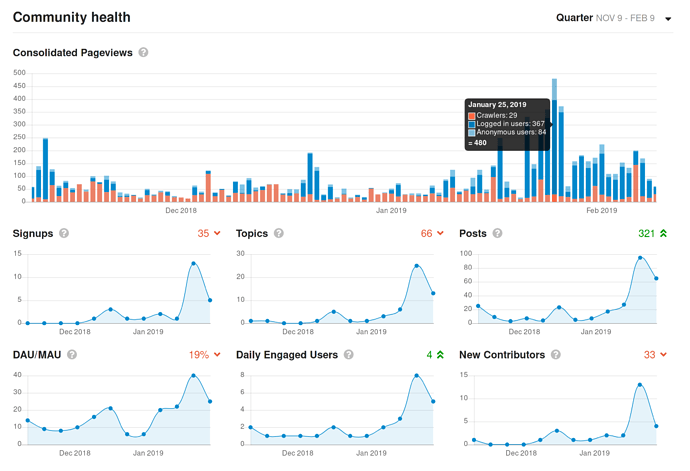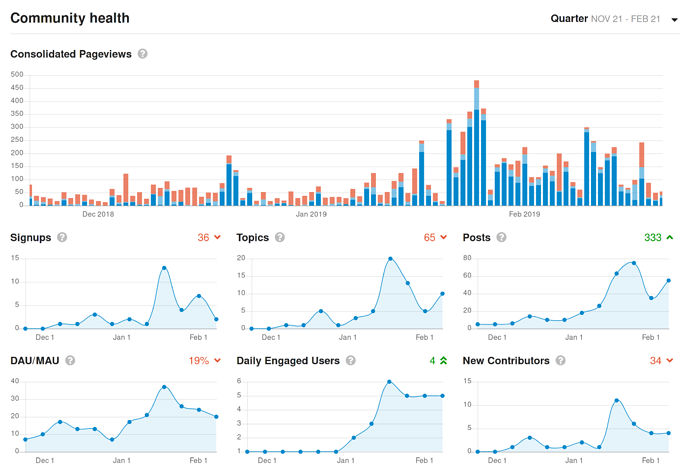To increase direct exchange within the degrowth network, together we have been holding various
- messengers

- written conversations on agora.degrowth.net.
Since inauguration of the site on August 24, 2018 we have created
Metric | Amount
- | -
Emails | 2280
Anonymous Visits | 2266
Visits | 600
Posts | 561
Topics | 142
Likes | 111
and helped to get to people the information they needed. This directed message exchange was enabled by the discourse.org software and the Degrowth Agora moderators. From an administrator perspective it looks like:
Minimising the bus factor
At first, before we can talk about the details and perspectives that are asking for our collective answers, we must shed light on a little power concentration that occured, and which should be reduced. The Ecobytes association is taking gare of degrowth networks, and takes part in multiple developments. Due to concentration of activities on our collective body, we have largely increased our bus factor.
In the past it has happened that we were centralising support for informational systems for degrowth. Due to concurrency of demands, this has often led to slow reaction times and unsatisfying relations. Unfortunately the actual effort is only visible to us, and our peers can hardly estimate from the outside how much of the actual work we are already hiding from them.
Our motivation is to invite for a continuing process of cocreation for this shared space. Our aim lies in distributing decisions to balance responsibilities and ease maintenance efforts. Taking power from us and returning it to the user communities of the platforms is also an emancipatory act.
If we would be asked to explain what’s missing for us, we could ask questions about:
-
Collecting use cases
Which kinds of online interactions do degrowth users expect? -
Appropriating the means
How can we mobilise the different user needs for coordinated action? -
Participation in development
Where do we actively engage with our users and kindly ask for contributions?
These perspectives are presented as conversation starters to support a holistic understanding of our online communications. In the following they will be used to sketch a rough overview of activities that happen here and elsewhere.
Collecting use cases
To understand the situation better, we start with a methodic enquiry into degrowth communities online. This analysis helps further on to establish a shared language, and also a shared understanding of what we are talking about. This is important for the reevaluating the demand that we are trying to meet.
From the perspective of the @communication group maintainers, we are able to distinguish between three main uses of information and communication technology for degrowth. We are offering them as a guideline to inform the upcoming discussions. They are:
- Offering different entry points
- Connecting groups of people
- Mapping time and space
Feel free to intervene below by sharing your points of view!
Let’s now spend some time with a narrative attempt in learning how we can differentiate these perspectives.
Offering community entry points
In the degrowth community, everyone is a convivial moderator that helps to keep the conversation flowing. In the broadest view, it seems we are engaging with three audiences/cohorts, of which each finds their appropriate entry point in
- degrowth.info
An information portal for the public, featuring a blog, a media gallery and a collection of previous conferences. - degrowth.org
A research and training association presenting their activities and reaching out to associated networks. - degrowth.net
A networking initiative and commons for coordinated work and exchange between individuals and groups.
These sites build up the entry points to the degrowth network in the world wide web. They are sensory surfaces which communicate the degrowth message through text and media onto the devices of the users. With varying degrees of participativeness, they offer an information architecture and a knowledge infrastructure for distributed cognition.
Connecting groups of people
Furthermore a recurring activity that takes place in online scapes is the act of connecting the different groups of people active for degrowth in multiple locations. It is intended to present a useful outside view for the general public on degrowth.info/groups.
These groups coordinate for different subjects and maintain their processes themselves. The participants in these groups inform each other about intermediary results of their work. This happens sometimes here on the Agora, and sometimes elsewhere. By providing means of exchange, we seek to enable the diverse degrowth communities to engage in fruitful conversation and action.
It is through our adherence to the principles of transparency and an open communication culture, that we embrace a public discourse that invites for participation of strangers. In being open about our intentions, and in being clear about our limitations, we are able to supply an inclusive environment for free speech.
Mapping time and space
To understand the distribution, self-understanding and activity of degrowth initiatives worldwide, there is now an ongoing mapping activity that surveys and visualises the realities in question. Its findings are presented on degrowth.info/map.
The survey is conceived as a data-first process and is based on participatory creation of structured data about the initiatives. This includes geoinformation via an address field.
The initial survey was conducted on degrowth.community. It was quickly provisioned to have a timely shot in distribution of the survey.
The current development vector aims at mobilising the mapping capabilities of agora.degrowth.net for a more participatory creation and curation of survey entries. It is prepared for reuse of the collected data in other representations, i.e. map visualisations.
The initial visualisation at map.degrowth.net is an improvised attempt at turning the addresses from the survey into geolocation information. It is published on the platform of the french uMap project.
Actually we are looking at a spatiotemporal mapping here. For communicating the events around the Global Degrowth Day 2019, there is a need to visualise the locations and times of what will be happening on the ground. Again a uMap is used for quick improvisation of a map view.
What we long for is a collaborative, multi-dimensional and context-sensitive mapping environment, that is equally capable of simplifying the degrowth narrative into a cartographic representation, while maintaining a grasp at the inherent diversity of the initiatives presented.
We believe this is established well by adding locations and events to the Agora here.
- agora.degrowth.net/map
A map of all things location on Agora. - agora.degrowth.net/c/events/l/map
This map displays the events that have been added to the Events category. - agora.degrowth.net/c/events/global-degrowth-day-2019/l/map
This is a map of Global Degrowth Day 2019.
These views are initial access points to the participatory mapping, and do not neccessarily have to resemble the final output of the mapping process. Now that we have established a place for a cocurated, semi-structured survey that produces structured data, we can always reuse it for representations in other forms or environments.
These are the very minimal use cases for degrowth communication online, which we are able to comprehend from earlier practice and conversation with the various partners. Are there other forms of exchange in use for communicating degrowth on the Web or in the Internet? Please tell us, if you know some, i.e. Twitter hashtags, Facebook groups, Meetups or alike!
Appropriating the means
In mastering these widespread fields of activities, we have come to resort to information and communication technology tools that mediate our communicative actions. The speech acts that we share with our community can be recorded in different forms, each having their appropriate field of application.
Currently we are often using:
- the cloud.degrowth.net for file and contact sharing, internal group calendars, and collaborative editing
- the agora.degrowth.net for public and private communication groups, technical support and networking
- groups
- wiki posts can be edited by multiple authors
- events and locations can be shared and visualised
- calendars provide an overview of events
- the pad.degrowth.net for collaborative writing of meeting notes, process scribbles
highly reusable when linked elsewhere - the thematic blogs that are in development
see housing.degrowth.net or ontgroei.degrowth.net for inspiration
Within all these tools we are establishing information architectures that decide upon the accessibility and memorability of conveyed messages. Now we would like to share responsibility for the immaterial, nonetheless determining decisions we as operators and maintainers repeatingly make for you.
With your help we would like to establish a loosely-coupled governance regime, which aids orchestration and adaptation of our distributed efforts. Here in the networks we act as swarms and build meshes that we rely on. This kind of practice is positively preferring valueing over ruling.
The suggestion remains to understand the infrastructures and conversations as a Commons. This would come with accepting the social, material and knowledge aspects of the process. These would be mobilised in an explicit attempt of Commoning, of constantly reestablishing our mutually shared environment as a Commons.
By constant gardening of our informational scapes, we have the chance to easily support cross-pollination of diverging actions and help strengthening the weak ties between us. Our activity has its spikes, phases with a higher amount of contributions, and its seasons, in which we recurringly evaluate the long-term directions that we take.
In broader terms, we are asking us how to achieve a harmonious sequentialisation, correlation of our collective attention, by allowing for and maintaining varying velocities.
These ideas continue from a draft about Ontogenesis & Procedure two years ago.
Participation in development
Please respond below if you can object or comment on the points made above. This text was written to transparently convey the questions that we come to ask ourselves in providing useful online communities. With your help we can offload some of this into community process, and ease the experience for all of us.
What we would like you to engage with is a constant re-invitation and co-moderation of the technical and social processes which revolve around our communication media.
We are offering them as emancipatory means for a strategic use of information and communication technologies to support transparency, cooperation and dissemination within the network. This is highly informed by learnings in distributed systems engineering that we have not managed to avoid. The tools bring a high degree of parallelism, in which we asynchronously avoid concurrence of attention. Instead, we suggest to consider ourselves to be embedded in the networks already, which comes with an implicit inbetweenness.
The language games that we continue here are part of historic configurations that we passed. They are also always incomplete to a sense, that universal truth is neither achievable not aspirable. This incompleteness incidentally mirrors the effects which we come to observe in non-deterministic systems, such as the distributed communication systems here.
To cope with the unforseen consequences of our actions, we luckily have a very tangible remedy at hands: Software can be adapted and updated to changing needs, and an overall process acknowledging for the limits in capacity can be anticipated at times. We strive for minimalism and opt for a timely imprint when ready.
This is why we rely on you and your user engagement so much. Without your opinion, we have no requirement at hands against which we could develop. This is a first attempt to begin a series of feedback cycles. When we turn the iteration over the current questions into a habit, inherent power is deconstructed and we achieve a state of toplessness: Nobody is the ruler and all convivially happen to happily act alongside each other.

